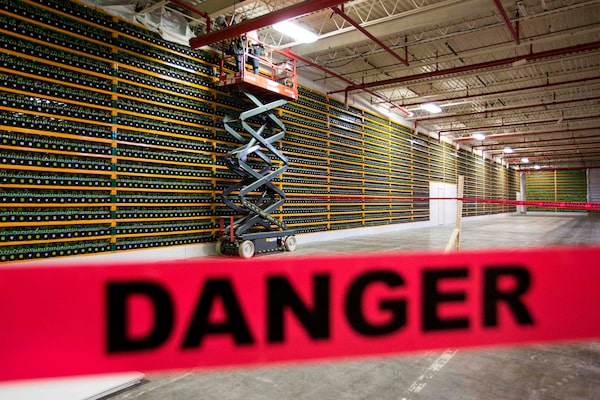
Construction workers use a lift along a wall of bitcoin mining at Bitfarms in Saint Hyacinthe, Quebec. Bitcoin was born from the 2008 financial crisis. Now crypto has its own crisis.LARS HAGBERG/AFP/Getty Images
There’s a certain irony in the saga of the FTX Trading Ltd. cryptocurrency exchange – an irony that, perhaps, might be a good thing for the industry.
Bitcoin, the original cryptocurrency and progenitor of the industry, was created in the wake of 2008 financial crisis. Its creation was fuelled by a disdain for what the banks did, their questionable accounting practices and rampant risk-taking that caused the crisis.
Bitcoin, which envisions a currency system without intermediaries or overseers, had wanted to cut out the financial institutions, central banks and governments. The utopia promised was a world in which a financial crisis could not happen (and if one did, the ones responsible would not be rewarded with bailouts).
Now, though, FTX, a leading institution in crypto, spectacularly collapses, the chaos spirals and the entire highly interconnected industry descends into scandal and turmoil – almost the exact same situation as the 2008 financial crisis.
Take whatever analogy you want: When you gaze long into the abyss, the abyss gazes also into you. Like ouroboros, the mythical serpent eating its tail, the circle is now complete.
The monster hunter in I Am Legend has come to realize that he is the monster. Batman has snapped the neck of the Joker, and by breaking his no-kill rule, become exactly what he has been trying to fight. The pigs, after overthrowing the humans at the farm, have started walking upright.
Over 13 years, crypto has turned 180 degrees from what it is supposed to be. If there ever is a moment to rebuild the industry and flush out the bloat and excess, and alleviate the dangerously piling pressure, this is it.
There’s a camp in cryptocurrency that sticks to only bitcoin and the founding ethos of it, so much so that these folks consider “crypto” a slur. Sometimes they are called maximalists. Sometimes they are disliked. Many of those folks align with conservative economic ideas and when the mainstream thinks of toxic bitcoin bros, they think of the maximalists.
But for years, these maximalists have been the loudest critics of the wider cryptocurrency world – the ape pictures selling for hundreds of thousands and the centralized exchanges, like FTX, that have become just like banks.
Now, it seems that perhaps these bitcoin bros have a point.
In the aftermath of the 2008 financial crisis, banks had better, less riskier practices forced upon them, either directly or indirectly. Observers have cited that as the reason banks were able to weather the financial downturn at the beginning of the pandemic.
There’s potentially a similar moment to be had in crypto, regardless of regulatory developments.
Consider Bull Bitcoin in Montreal, a bitcoin-only brokerage. It has avoided having to comply with the more stringent rules on exchanges, imposed by Canadian securities regulators after the fall of the platform QuadrigaCX.
And it will never be affected by the bank run that brought down FTX, in which customers, on learning of its problems, tried to withdraw funds that the platform didn’t have on hand.
That’s because Bull Bitcoin is non-custodial. Users directly buy and sell bitcoins through their own digital wallets. The platform doesn’t hold users’ funds for them. Such models will no doubt see more adoption in the wake of the FTX saga.
A similar concept is decentralized finance, or DeFi, in which users trade with their own wallets on blockchain-based platforms that have no central administrators – which, again, do not hold users’ funds for them.
Yes, such platforms are hard to build perfectly, and poorly designed DeFi products, such as the terraUSD stablecoin, have themselves caused spectacular crypto collapses. But in the days following the FTX collapse, DeFi volumes spiked.
According to research from the industry publication The Block, DeFi daily revenue jumped to US$8-million on Nov. 9 – yes, it’s still a relatively young field – the highest since mid-June. In a normal day, it’s rare for daily revenue to top US$3-million.
People have veered away from centralized, bank-like platforms in crypto and gravitated toward ones in which users hold their own funds – which is what crypto was designed for.
In comic books, major crossover story arcs (think Marvel’s The Infinity War, on which the films are based) are traditionally followed by a phase of “narrative de-escalation,” in which storylines go back to basics, essentially reset. Something similar appears to be happening in crypto.
It remains to be seen how close to the basics crypto will get and whether it would stick there. But at least it’s the right direction.
 Ethan Lou
Ethan Lou